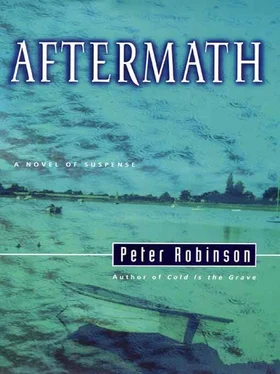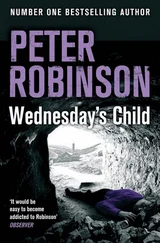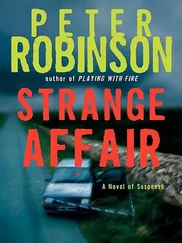Peter Robinson - Aftermath
Здесь есть возможность читать онлайн «Peter Robinson - Aftermath» весь текст электронной книги совершенно бесплатно (целиком полную версию без сокращений). В некоторых случаях можно слушать аудио, скачать через торрент в формате fb2 и присутствует краткое содержание. Жанр: Детектив, на английском языке. Описание произведения, (предисловие) а так же отзывы посетителей доступны на портале библиотеки ЛибКат.
- Название:Aftermath
- Автор:
- Жанр:
- Год:неизвестен
- ISBN:нет данных
- Рейтинг книги:5 / 5. Голосов: 1
-
Избранное:Добавить в избранное
- Отзывы:
-
Ваша оценка:
- 100
- 1
- 2
- 3
- 4
- 5
Aftermath: краткое содержание, описание и аннотация
Предлагаем к чтению аннотацию, описание, краткое содержание или предисловие (зависит от того, что написал сам автор книги «Aftermath»). Если вы не нашли необходимую информацию о книге — напишите в комментариях, мы постараемся отыскать её.
Aftermath — читать онлайн бесплатно полную книгу (весь текст) целиком
Ниже представлен текст книги, разбитый по страницам. Система сохранения места последней прочитанной страницы, позволяет с удобством читать онлайн бесплатно книгу «Aftermath», без необходимости каждый раз заново искать на чём Вы остановились. Поставьте закладку, и сможете в любой момент перейти на страницу, на которой закончили чтение.
Интервал:
Закладка:
Banks poked around in the wardrobe: suits, shirts, dresses, shoes – mostly women’s – nothing he wouldn’t have expected. They would all have to be bagged by the SOCOs and examined in minute detail.
There were plenty of knickknacks in the bedroom, too: Limoges cases, musical jewelry boxes, lacquered, hand-painted boxes. The room took its musky rose and aniseed scent, Banks noticed, from a bowl of potpourri on the laundry hamper under the window.
The bedroom faced The Hill, and when Banks parted the lace curtains and looked out of the window, he could see the houses atop the rise over the street, half hidden by shrubs and trees. He could also see the activity below, on the street. He turned and looked around the room again, finding it somehow depressing in its absolute sterility. It could have been ordered from a color supplement and assembled yesterday. The whole house – except for the cellar, of course – had that feel to it: pretty, contemporary, the sort of place where the up-and-coming young middle-class couple about town should be living. So ordinary, but empty.
With a sigh, he went back downstairs.
3
Kelly Diane Matthews went missing during the New Year’s Eve party in Roundhay Park, Leeds. She was seventeen years old, five feet three inches tall and weighed just seven stones. She lived in Alwoodley and attended Allerton High School. Kelly had two younger sisters: Ashley, age nine, and Nicola, age thirteen.
The call to the local police station came in at 9:11 A.M. on the first of January, 2000. Mr. and Mrs. Matthews were worried that their daughter hadn’t come home that night. They had been to a party themselves, and hadn’t arrived back until almost 3 A.M. They noticed that Kelly wasn’t home yet but weren’t too worried because she was with friends, and they knew that these New Year’s parties were likely to go on until the wee hours. They also knew she had plenty of money for a taxi.
They were both tired and a little tipsy after their own party, they told the police, so they went straight to bed. When they awoke the following morning and found that Kelly’s bed had still not been slept in, they became worried. She had never done anything like this before. First they telephoned the parents of the two girlfriends she had gone with, reliable in their estimation. Both Kelly’s friends, Alex Kirk and Jessica Bradley, had arrived home shortly after two in the morning. Then Adrian Matthews rang the police. PC Rearden, who took the call, picked up on the genuine concern in Mr. Matthews’s voice and sent an officer around immediately.
Kelly’s parents said they last saw her around seven o’clock on the thirty-first of December, when she went to meet her friends. She was wearing blue jeans, white trainers, a thick cable-knit jumper and a three-quarter-length suede jacket.
When questioned later, Kelly’s friends said that the group had become separated during the fireworks display, but nobody was too concerned. After all, there were thousands of people about, buses were running late and the taxis were touting for business.
Adrian and Gillian Matthews weren’t rich, but they were comfortably off. Adrian oversaw the computer systems of a large retail operation and Gillian was assistant manager of a city center building society branch. They owned a Georgian-style semi-detached house not far from Eccup Reservoir, in an area of the city closer to parks, golf courses and the countryside than to factories, warehouses and grim terraces of back-to-backs.
According to her friends and teachers, Kelly was a bright, personable, responsible girl who got consistently high marks and was certain to land in the university of her choice, at the moment Cambridge, where she intended to read law. Kelly was also her school’s champion sprinter. She had beautiful gold-blond hair, which she wore long, and she liked clothes, dancing, pop music and sports. She was also fond of classical music and quite an accomplished pianist.
It soon became clear to the investigating officer that Kelly Matthews was a most unlikely teenage runaway, and he instituted a search of the park. When, three days later, the search parties had found nothing, they called it off. In the meantime, police had also interviewed hundreds of revelers, some of whom said they thought they’d seen her with a man and others with a woman. Taxi drivers and bus drivers were also questioned, to no avail.
A week after Kelly disappeared, her shoulder bag was found in some bushes near the park; in it were her keys, a diary, cosmetics, a hairbrush and a purse containing over thirty-five pounds and some loose change.
Her diary yielded no clues. The last entry, on the thirty-first of December, 1999, was a brief list of new year’s resolutions:
1. Help Mum more around the house.
2. Practice piano every day.
3. Be nicer to my little sisters.
Banks stripped off his protective clothing, leaned against his car out in the street and lit a cigarette. It was going to be a hot, sunny day, he could tell, only the occasional high cloud scudding across the blue sky on a light breeze, and he would be spending most of it indoors, either at the scene or at Millgarth. He ignored the people on the other side of the road, who stopped to stare, and shut his ears to the honking horns from the snarl of cars up The Hill, which had now been blocked off completely by the local traffic police. The press had arrived; Banks could see them straining at the barriers.
Banks had known it would come to this eventually, or to something very much like this, from the first moment he had agreed to head the North Yorkshire half of the two-county task force into the series of disappearances: Five young women in all, three from West Yorkshire and two from North Yorkshire. The West Yorkshire Assistant Chief Constable (Crime) was in overall charge, but he was at county headquarters in Wakefield, so Banks and Blackstone rarely saw him. They reported directly to the head of CID, Area Commander Philip Hartnell, at Millgarth in Leeds, who was the official senior investigating officer, but who left them to get on with the job. The main incident room was also at Millgarth.
Under Banks and Blackstone came several detective inspectors; a whole host of detective constables and sergeants, culled from both West and North County forces; skilled civilian employees; Crime Scene Coordinator DS Stefan Nowak; and, acting as consultant psychologist, Dr. Jenny Fuller, who had studied offender profiling in America with the National Center for the Analysis of Violent Crime at the FBI academy in Quantico, Virginia, and didn’t look a bit like Jodie Foster. Jenny had also studied with Paul Britton in Leicester and was recognized as one of the rising stars in the relatively new field of psychology combined with police work.
Banks had worked with Jenny Fuller on his very first case in Eastvale, and they had become close friends. Almost more, but something always seemed to get in their way.
It was probably for the best, Banks told himself, though he often couldn’t convince himself of that when he looked at her. Jenny had such lips as you rarely saw on anyone but a pouting French sex symbol, her figure tapered and bulged in all the right places and her clothes, usually expensive clothes, silky mostly in green and russet, just seemed to flow over her. It was that “liquefaction of her clothes” that the poet Herrick wrote about, the dirty old devil. Banks had come across Herrick in a poetry anthology he was working his way through, having felt a disturbing ignorance in such matters for years.
Lines like Herrick’s stuck with him, as did the one about “sweet disorder in the dress,” which made him think of DS Annie Cabbot, for some reason. Annie wasn’t so obviously beautiful in the way Jenny was, not as voluptuous, not the kind to draw wolf whistles on the street, but she had a deep, quiet sort of beauty that appealed very much to Banks. Unfortunately, because of his new and onerous responsibilities, he hadn’t seen much of Annie lately and had found himself, because of the case, spending more and more time with Jenny, realizing that the old feelings, that odd and immediate spark between them, had never gone away. Nothing had happened as such, but it had been touch and go on occasion.
Читать дальшеИнтервал:
Закладка:
Похожие книги на «Aftermath»
Представляем Вашему вниманию похожие книги на «Aftermath» списком для выбора. Мы отобрали схожую по названию и смыслу литературу в надежде предоставить читателям больше вариантов отыскать новые, интересные, ещё непрочитанные произведения.
Обсуждение, отзывы о книге «Aftermath» и просто собственные мнения читателей. Оставьте ваши комментарии, напишите, что Вы думаете о произведении, его смысле или главных героях. Укажите что конкретно понравилось, а что нет, и почему Вы так считаете.












